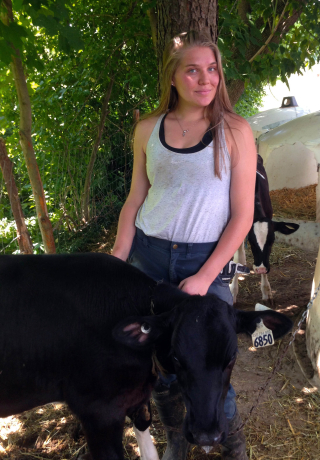
Students who are not originally from a farming background have much to gain from these courses. For someone who is passionate about agriculture but grew up in an urban centre, the opportunity to acquire hands-on work experience is often non-existent before coming to FMT. Limited exposure to agriculture creates an additional barrier to full comprehension of course material, definitions, and best practices when they start the program.
Sophie Mitchell – Pavue Farms
Sophie Mitchell grew up in Montreal, but developed her passion for agriculture through summer visits to her grandparents' cherry orchards in Michigan. She spent her summer internship on a dairy farm to gain a better understanding of raising livestock, dairy in particular. Pavue Farms in Cleveland, QC is owned by Maria Enright and Tim Keenan. They milk 68 cows and grow corn and hay to feed their animals. Tim is a graduate of Macdonald and two of their four children are enrolled in the FMT program.
In the first half of her stage, Sophie learned the daily routine on the farm. “Each task was completely new to me when I first started….Overall, I've learned to be more attentive to the animals' needs and their health, I am more aware of my surroundings, and I also learned how to drive a tractor.”
“I am extremely grateful to have had this experience….I have gained a whole new perspective on agriculture in general, but also dairy farming in particular. [It has] allowed me to experience everything that I learned during my first year in FMT,” she stated.
While many concepts are taught in class and followed up by practical labs, sometimes only work experience can truly help students understand what they are learning in FMT. “Having seen the essential farm practices [soil tillage and seeding for example] with my own eyes in a real situation, I now have a much better understanding of the purpose and the importance of the things learned in school.” This is especially true for students who were not raised on farms.
On the subject of her expectations for the summer, Sophie wrote, “I have absolutely exceeded my learning expectations since the very first day. Not a day has passed where I learned nothing.... I now have a more accurate perspective of farming since I have first-hand experience. I have learned a lot about animal care, but also about field work.”
-
This feature was originally published in the July-August 2018 issue of the QFA Advocate on the Macdonald Reports page.